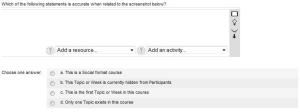Around the country school budgets at the state level are under the knife. In CA, the budget shortfall has put at jeopardy CTAP (an entire statewide network of professional development) and in one district alone (LAUSD) has caused 3000 education staff members to be released. If I’m a public school teacher/student in urban CA I’m shakin’ in my booties.
In my home state of Vermont there is all sorts of pressure to cut the biggest slice of the budget pie (education) though nothing better than taking shots at the teacher’s union and administrators whose salaries/benefits account for roughly 70% of the entire budget. These are all necessary pieces of the conversation, unfortunately there’s another side of the story.
While pay was taking up a large amount of costs of total school budgets, it was not translating into more $$ for technology/professional development/classroom budgets. In lieu of more money, some teachers found ways to augment their classrooms with free web-based technology provided by the countless start-ups around the world catering to the education/business world with fancy, easy-t0-use web-based applications. Teachers, it seems, always are looking for ways to do more with less, unfortunately, it’s looking like some of the freebies so highly touted by bloggers and technologists nationwide are going the way of the dinosaurs.
The financial crisis is already causing companies providing free services to cut offerings. The “if you build it they will pay” mentality has hit the brick wall that is financial reality. Many companies who staked their claim at offering something for free were actually trying to establish their market place through a large virtual land grab: take this free stuff and they hope 1. that they’ll sign up more people than the next guy doing the same thing, 2. that they’ll be able to figure out to make money from you without pissing you off and forcing you to go to the next guy and 3. that if they do offer a paid service it’ll be good enough that you’ll want to (voluntarily) pay them. The reality is that the real costs of business are growing more and more apparent. The financial crisis, specifically for these educational service companies, is making the market smaller in some cases (as teachers are forced to re-evaluate paid services) and is forcing them to evaluate the business plan that once incorporated a free version of their service. What I think is currently happening is that these services are slowly changing their business plans to focus on revenues rather than total userbase (after all 5 paying customers is better for the balance sheet than 1000 free customers which are all liabilities i.e. cost of servers, support, etc.).
plans to focus on revenues rather than total userbase (after all 5 paying customers is better for the balance sheet than 1000 free customers which are all liabilities i.e. cost of servers, support, etc.).
Now, you’re probably thinking, but what services have gone away? Well, the first was as high profile as they get. Google, at the end of 08 discontinued one of it’s services called Lively (which at least one teacher found valuable to their classroom). Another service, co.comments ended. And some other bloggers have picked up on this as well: end of Innocence, death of web2.0.
What’s funny is that this whole scenario is cyclical (talk about deja vu). Pundits believed the exact same was happening in 2001 after the bubble burst.

 After:
After: Tada!
Tada!